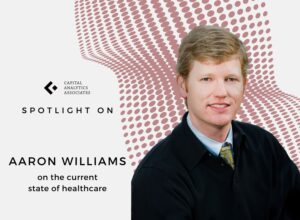 2 min read May 2023 — Focus: spoke with Privia Health’s Senior Vice President & General Manager of Privia Medical Group — Georgia & Tennessee, Aaron Williams, about the company’s recent highlights, and how they are navigating current market dynamics and challenges with independent practitioners, as well as the outlook and priorities for Privia Medical Group — Georgia in the coming years.
2 min read May 2023 — Focus: spoke with Privia Health’s Senior Vice President & General Manager of Privia Medical Group — Georgia & Tennessee, Aaron Williams, about the company’s recent highlights, and how they are navigating current market dynamics and challenges with independent practitioners, as well as the outlook and priorities for Privia Medical Group — Georgia in the coming years.
What were some key highlights for the company in Atlanta over the last 12 months?
2022 was another successful year for Privia Medical Group — Georgia from a growth and performance standpoint. We entered new communities by adding additional practices to our medical group. We’ve been laser focused on the development of clinical programs to help extend physicians’ reach to patients and expanding access to healthcare.
How has Privia navigated current market dynamics?
Issues with inflation and labor shortage aren’t foreign to us or physician practices. Privia’s size, scale and ability to approach different aspects like medical supplies enables physicians to focus on their practice.
That said, it’s becoming extremely difficult with the workforce shortage. All of this is very challenging for independent practices. Privia offers immense support with their practice management system.
Why do newer generations of independent practitioners gravitate more toward working in hospitals instead of starting their own practice?
PGY2’s start considering careers early on. Many of them are coming out of medical school with debt and they’re not making money as a resident. Young doctors now are focused on physician burnout. They want to pay off their loans and have a good life. They don’t realize independent primary care is there and can offer that. They all agree spending time with a patient is most important. The fee-for-service model makes it difficult to target all the chronic conditions in 15 minutes. Doctors can still go into primary care and have that support with Privia’s model.
Physicians go to med school to become physicians, not business owners and managing business affairs. Resident training prepares them to be physicians. We’re partnering with our physician practices and expanding to offer those opportunities for new graduates coming out of residency. It’s powerful to be able to offer that as a medical group.
How can Privia provide resources for independent practitioners and how does that resolve issues with lack of care?
The state is partnering with academic medical centers to offer opportunities for residents to go into rural communities to complete their residency process. There are incentives for loan and debt around their medical education. Independent physician practices are of great value and they’re underappreciated. Primary care practices are best positioned to help fix a broken healthcare system nationwide and help to control costs. Expanding care to rural communities is a major priority for us.
Telehealth has helped access tremendously. Our doctors have patients living in rural Georgia that aren’t able to come in, but we can have a telehealth visit. Physicians can order their blood work at a local lab and the result still comes to them. It’s more doable. The athenaOne platform is very simple and patients can access it with their phones.
What does the volume to value shift mean in the fee-for-service model and how might that be evolving?
Physicians get to know their patients and exactly what they need for better care. The fee-for-service model makes it difficult to see 20, 25 patients in one day and address six diagnoses that are all very critical to their wellbeing. A value-based care approach allows physicians to spend as much time as needed. Some patients need 45 minutes to talk about their social determinants of health. It’s important to have time to focus on what’s going on in a patient’s life and avoid burnout. The shift in fee-for-service to value-based care is tying reimbursement to providing high quality, low cost care and improving the patient’s overall well-being. Value-based care is all focused on the patient and their outcome while reimbursing the physician on the quality and overall well being of their patient.
What unique or defining characteristics make Atlanta a great place to set up a physician practice or establish a business?
Atlanta offers so many different organizations and opportunities from the healthcare perspective. It’s a very attractive place for all industries. We’re seeing that in a rapid growth of newer residents and the constraint of current resources for primary care services. Atlanta would be top of mind if I were a physician.
Are there any trends or developments that might be influential over the coming years?
Technology has helped independent practices boom. Patients are able to schedule online and reach their doctors through a portal and can reach out anytime. Patient portals also give physicians the support and access to their patient’s needs outside the office. This helps show payers that physicians are providing value to the beneficiaries. There’s no way an independent doctor can do it alone. Privia provides the help and support with tech and where we’re going. It’s going to get even better.
What is your outlook for the organization and your industry in the next few years?
Our focus is further improving the wellbeing and outlook for patients and our physicians. There’s great opportunity ahead of us and executing on that is of utmost importance to us. Our number one priority is helping to improve the healthcare environment within Atlanta and across the state.
For more information, visit:
